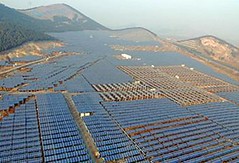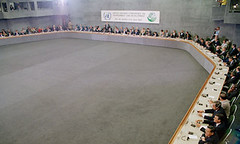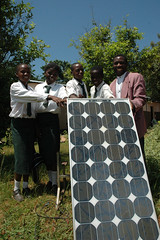首页 > 最新消息 > 活动 > 只有永续发展能创造「韧性」的地球
相关连结:http://e-info.org.tw/node/73844
摘译自2012年1月31日ENS衣索比亚,亚的斯・亚贝巴报导;段誉豪编译;蔡丽伶审校
 联 合国一个由现任与卸任元首、部长以及国会议员所组成「全球永续发展高阶小组」,1月30日提出了一项新报告,为今年6月将在巴西所举办的「联合国永续发展 大会」,启动了一项「常绿」绿色革命,推动全球能停止使用化石燃料;该计画并与联合国的扶贫、对抗不公平等议题相连结,利用促进风能、太阳能以及其他可再 生性能源,来推动富国与穷国的经济。
联 合国一个由现任与卸任元首、部长以及国会议员所组成「全球永续发展高阶小组」,1月30日提出了一项新报告,为今年6月将在巴西所举办的「联合国永续发展 大会」,启动了一项「常绿」绿色革命,推动全球能停止使用化石燃料;该计画并与联合国的扶贫、对抗不公平等议题相连结,利用促进风能、太阳能以及其他可再 生性能源,来推动富国与穷国的经济。
这份名为《韧性的人类与地球:值得选择的未来》(Resilient People, Resilient Planet: A Future Worth Choosing)的报告,包含56项能能快速实现永续发展的建议,让永续发展从笼统的概念成为主流经济学的核心。
报告指出,「各国政府和国际组织应努力创造新的绿色革命,一个属於21世纪的『常绿的绿色革命』,对农业研究、保护危急的动植物、水土保育以及对抗污染方面进行更多的投资。」
报告建议设立区域海洋与沿岸管理机构,保护提供1.7亿个工作机会、喂饱全球五分之一人口的海洋渔业。
工作小组建议政府应该「在区域、国家与国际层级上,促进年轻人参与并在决策过程中发挥影响力。更进一步的,协商的过程与对话应该鼓励纳入年轻社群与非传统网络的声音,像是网路论坛以及舆论部落格。」
韧性 迈向Rio+20的思考准备 此份报告可说为2012年6月20至22日於巴西举办的联合国永续发展大会(Rio+20),进行会前暖身工作。该大会的主轴有二:绿色经济背景下的永续发展与消除贫穷,以及永续发展的体制框架。大会最后将会提出一份政治性的文件。
此份报告可说为2012年6月20至22日於巴西举办的联合国永续发展大会(Rio+20),进行会前暖身工作。该大会的主轴有二:绿色经济背景下的永续发展与消除贫穷,以及永续发展的体制框架。大会最后将会提出一份政治性的文件。
这个大会是20年前、1992年里约地球高峰会历史性会议之后,每十年一次的会议。1992年当时,有100多位元首参与,启动了全球环境运动并通 过「21世纪议程」(Agenda 21),成为全球永续发展行动的蓝图。也是在该次会议中,全球首度一致接受在联合国气候变化框架公约之下,订定自愿性的温室气体排放控制协议。
不过联合国高阶小组在这份新的报告中警告,全世界还没有解决「永续发展的困境」。
小组报告中写道,「随著全球人口由70亿增加到2040年的接近90亿,而中产阶级消费者在未来20年间增加30亿人的情况下,对资源的需求将会呈指数性的成长。」
粮食、饮水、能源三大问题 需有综合性的视野 「2030年时,全世界至少需要比现在多50%的粮食、45%的能源以及30%的水,使环境的负荷量被推到新的界线上。这些都是真实且不只是造成气候变迁,会在各方面影响人类与地球的健康。」
「2030年时,全世界至少需要比现在多50%的粮食、45%的能源以及30%的水,使环境的负荷量被推到新的界线上。这些都是真实且不只是造成气候变迁,会在各方面影响人类与地球的健康。」
小组最殷切的建议之一是在「粮食、饮水以及能源议题之间,建立新的关系,而不是分开讨论。这三项议题必须要完全整合,如果要处理全球量时危机就不能个别处理。」
小组敦促政府「建立评价永续发展的价值信号,引导家庭、企业以及公部门做消费与投资的决定。」
小组建议政府建立的价值信号包括:
- 在2020年以前,通过税收、法规或排放权交易等机制,建立自然资源和外部的定价工具,包括碳定价。
- 改革国家财政和信贷系统,提供长期奖励永续行为,同时惩罚不永续的行为。
- 发展并扩大国家与国际生态系统管理计画,像是用水、农业、渔业以及林业系统。
- 2020年以前,停止对石化燃料的补贴,并减少其他「不正当或扭曲的补贴」。在所提出的56项建议中,小组赞同潘基文秘书长的「所有人的永续能源」倡议,并认为应即刻实施。
在这份报告中,小组注意到「近年来再生能源在电力、热能以及运输方面的大幅成长,估计可再生能源占了全球总消耗能源的16%。2010年间,新增的电力来源中约有50%属於可再生能源。」
 报 告指出,「电力部门方面的进展尤其显著,2010年间可再生能源供应了全球将近20%的电力」,强调「科学」是永续发展议题中做决定的基础,并呼吁每年定 期出版的全球永续发展展望报告,应该由联合国秘书长担任召集工作,以整合各部门与机构的知识,并考虑设立科学谘询委员会或是科学顾问。
报 告指出,「电力部门方面的进展尤其显著,2010年间可再生能源供应了全球将近20%的电力」,强调「科学」是永续发展议题中做决定的基础,并呼吁每年定 期出版的全球永续发展展望报告,应该由联合国秘书长担任召集工作,以整合各部门与机构的知识,并考虑设立科学谘询委员会或是科学顾问。
小组建议,整体来说,各国应全面将商业产生的社会与环境成本,整合至商品与服务的价格与措施之中。
※ 完整报告下载
UN Panel: Only Sustainable Development Can Create a 'Resilient Planet' ADDIS ABABA, Ethiopia, January 31, 2012 (ENS)A panel of current and former heads of government, ministers and lawmakers Monday launched a plan for world leaders to propel an "ever-green" energy revolution that could wean the world off fossil fuels, when they meet in Brazil later this year.
The report of the High-level Panel on Global Sustainability links the United Nations' goals of reducing poverty and inequality to promoting the use of wind, solar and other renewable energy sources to power the economies of rich and poor nations alike.
The report, "Resilient People, Resilient Planet: A Future Worth Choosing," contains 56 recommendations to put sustainable development into practice quickly, moving it from a general concept to the core of mainstream economics.
The report says governments and international organizations "should work to create a new green revolution, an 'ever-green revolution' for the 21st century" by spending more on agricultural research, protecting imperiled plant and animal species, conserving land and water and fighting pollution.
It urges creation of regional oceans and coastal management bodies that protect world fisheries, which supply 170 million jobs and daily protein for about one in five people on the planet.
The panel advises governments to "enable young people's participation in and influence on decision-making processes at the local, national and international levels. In addition, consultation processes and dialogue should be encouraged to incorporate voices from non-conventional networks and youth communities, such as Internet forums and opinion-making blogs."
The report of the High-level Panel contributes to preparations for the UN Conference on Sustainable Development (Rio+20) in Brazil June 20-22, 2012.
Rio+20 will focus on two themes - a green economy in the context of sustainable development and poverty eradication; and the institutional framework for sustainable development. It will result in a focused political document.
This conference comes 20 years after the landmark Earth Summit in Rio in 1992 that attracted more than 100 heads of state and government and energized the global environmental movement, leading to the adoption of Agenda 21, a blueprint for action to achieve sustainable development worldwide. It was there that the world first agreed to accept voluntary controls on greenhouse gases under the UN Framework Convention on Climate Change.
But the High-level Panel warns in its new report that the world has not yet solved the "sustainable development dilemma."
"As the global population grows from 7 billion to almost 9 billion by 2040, and the number of middle-class consumers increases by 3 billion over the next 20 years, the demand for resources will rise exponentially," the panel writes.
"By 2030, the world will need at least 50 per cent more food, 45 per cent more energy and 30 per cent more water - all at a time when environmental boundaries are throwing up new limits to supply. This is true not least for climate change, which affects all aspects of human and planetary health."
One of the panel's most urgent recommendations is to create "a new nexus between food, water and energy rather than treating them in different 'silos.' All three need to be fully integrated, not treated separately if we are to deal with the global food security crisis."
The panel urges governments to "establish price signals that value sustainability to guide the consumption and investment decisions of households, businesses and the public sector."
Among these signals, the panel recommends that governments:
Establish natural resource and externality pricing instruments, including carbon pricing, through mechanisms such as taxation, regulation or emissions trading systems, by 2020
Reform national fiscal and credit systems to provide long-term incentives for sustainable practices, as well as disincentives for unsustainable behaviour
Develop and expand national and international schemes for payments for ecosystem services in such areas as water use, farming, fisheries and forestry systems
Phase out fossil fuel subsidies and reduce other "perverse or trade-distorting subsidies" by 2020. Among its 56 recommendations, the panel endorses the Secretary-General Ban's "Sustainable Energy for All" initiative, which it says should be implemented "without delay."
In its report, the panel notes that, "Recent years have seen renewable energy's share of power, heat and transport grow strongly, with renewables accounting for an estimated 16 per cent of global final energy consumption. Renewable energy accounted for about 50 per cent of total added power-generating capacity in 2010."
"Progress has been especially marked in the electricity sector," the panel said, "where renewables delivered close to 20 per cent of the world's electricity in 2010."
The panel's report underscores the importance of science as an essential guide for decision making on sustainability issues. It calls on the secretary-general to lead efforts to produce a regular Global Sustainable Development Outlook report that integrates knowledge across sectors and institutions, and to consider creating a science advisory board or scientific advisor.
Overall, the panel recommends that nations fully integrate the social and environmental costs of their commerce into the prices and measures of their economic goods and services.
全文及图片详见:http://www.ens-newswire.com/ens/jan2012/2012-01-31-01.html